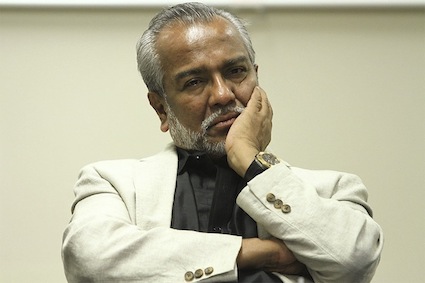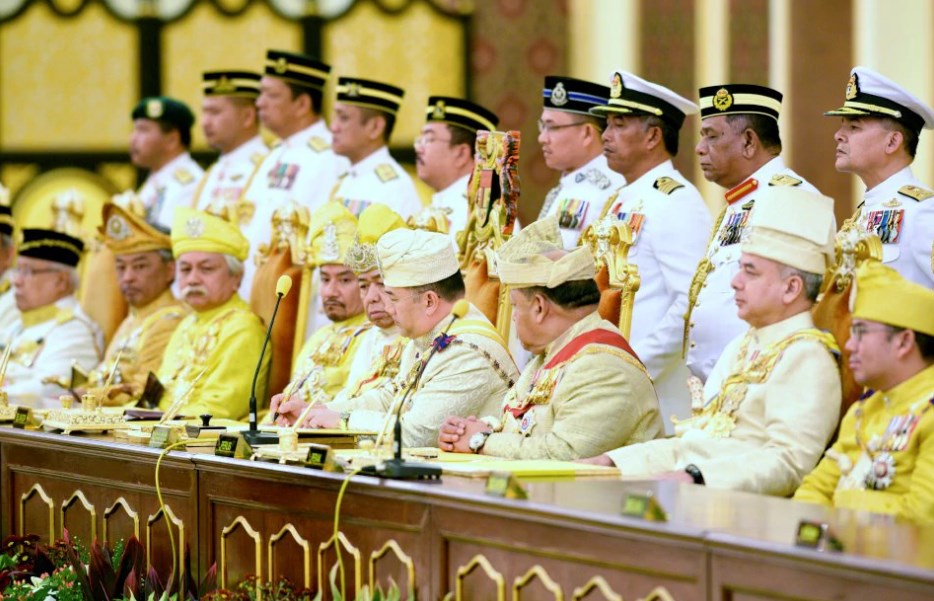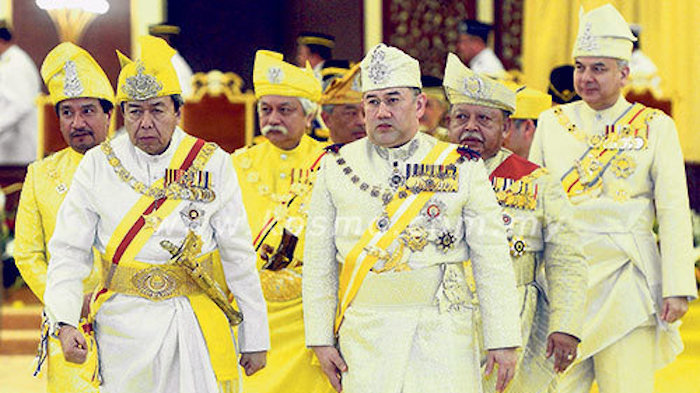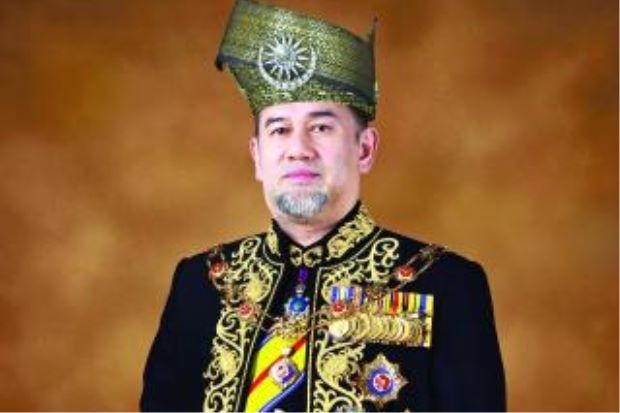Legal controversies on current election and succession of the Yang di-Pertuan Agong

Muhammad Shafee Abdullah, Advocate & Solicitor
Executive Summary
This article is intended to provide useful background pertaining to the election of the Yang di-Pertuan Agong (YDPA). It is written with special reference to the imminent election of the 16th YDPA, paying close attention to the following issues:
(a) What are the underlying principles in the election of the YDPA?
We have stressed that although the Federal Monarchy is based on a 5 year rotation system to allow all its 9 Malay Rulers to have their turn gracing the Federal Throne, the First Constituted List in 1957 was crafted to ensure the most senior of the Rulers take the Throne earlier. Seniority then was based on the date of ascession of that Ruler to his own State throne. In the First Constituted List, if a newly appointed Ruler were to come in as a result of the change of the Ruler in his State, his State would be placed last on the list.
(b) Does the seniority principle survive after?
The First Constituted List in spite of Part 1 of the First Schedule [section 4(3) and 4(4)] not stating expressly the requirement that a newly appointed Ruler assumes the last position as in the case of section 4(2)(b) governing the First Constituted List?
We have attempted to answer this by citing two schools of thought.
(i) The first school of thought (using the Order principle) interprets section 4 as a whole literally, viz, what is not stated is not required and therefore the seniority principle in respect of a new Ruler does not apply and this would mean the newly crowned Pahang Sultan ought to be offered by the Conference of Rulers, to be the 16th YDPA
(ii) The second school of thought (using the seniority principle) takes the opposite view. This view seems to be the more popular one supported by eminent legal jurists throughout history until present.
They argue that the rigidity in marshalling the First Constituted List using the seniority principle must surely and implicitly impact all mechanization of subsequent lists as that seniority principle is inbuilt in sections 4(3) and 4(4) of Part 1 of the Third Schedule.
If this Seniority principle is applicable, it ensures experienced and matured Rulers familiar with the ways of the Conference of Rulers and the administration of the State to suitably ascend to the Federal throne.
If this seniority Principle is accepted by the Conference of Rulers on the 24th January 2019, the Sultan of Johor ought to be offered the Federal throne by the Conference of Rulers as the newly crowned Sultan of Pahang would have to take the third (last) place after Perak.
(iii) Is the discretionary power of the Conference of Rulers so unfettered or unbridled that the Conference can ignore these principles of election of the YDPA in the third Schedule? We answered this tersely. The Conference of Rulers has no discretion but to follow the strict guidelines in the Third Schedule. The only discretion they have is when they consider if a particular candidate on the list, for whatever cause, is unsuitable for the appointment. We have suggested clear misconduct that is notoriously known can amount to acceptable reasons for the invocation of such discretion not to elect/offer the position to the otherwise eligible candidate. We have stressed that the sheer fact that the decision of the Conference of Rulers pertaining to the election of the YDPA is non-justiciable and therefore non-challengeable in any court, makes heavy demands on the Conference of Rulers to apply the proper election principles as provided in Part 1 of the Third Schedule.

Main Article
Introduction
1. Malaysia is a Constitutional Monarchy, most unique in the world and the uniqueness was born out of necessity in 1957 when we achieved independence. Unlike England, the Constitution reigns supreme in Malaysia that even the King is governed and bound by it.
2. Out of the 13 States in Malaysia, 9 Malay States have Malay Rulers, whilst the other states have Governors. Out of the nine Malay states, seven of them are hereditary monarchies founded on agnotic primogeniture. In Perak, the throne rotates among the three royal families. In Negeri Sembilan, a kind of elective monarchy has been in place where the Ruler is elected by hereditary Chiefs called “Undangs”.
3. Upon independence in 1957, a Supreme Head of the Federation was thought to be necessary as a beacon of unity and protection and common identity. As there are 9 Malay State Rulers, rotation among them to be the Supreme Head of the Federation became a sheer necessity and political expediency. The system already in place in Negeri Sembilan was apparently what inspired our First Prime Minister to establish our constitutional monarchy system based on a 5 year rotation of election among the Rulers.
The descriptive term for the King was historically suggested by the Reid Commission as “Yang Di Pertuan Besar”, an indication of the influence of the Negeri Sembilan system and perhaps as a symmetry to the concept of “Menteri Besar”, the former being head of a State and the latter the head of the administration of the Malay States. The term the Yang Di-Pertuan Agung (“YDPA”) was finally agreed upon to avoid any confusion with the Ruler of Negeri Sembilan, who adorns himself with the same title.
4. Election Mechanism of the Yang di-Pertuan Agong
The election of the YDPA is governed by several principles cast in stone in the Federal Constitution. These are:
(a) Seniority;
(b) a five-year maximum rotation term of office;
(c) both seniority and rotation are governed by the rigid constituted or reconstituted list mechanism.
5. When the Federal Constitution was being drafted, the nine Rulers were consulted of the basis of their appointment as the King. The nine Malay Rulers were most anxious that the election amongst them to that apex position shall be on a 5 year maximum rotation system and that it shall be scrupulously undertaken so as not to cause any misunderstanding and disharmony among them and their respective Malay States. It was on that basis that Part IV (consisting of Articles 32 to 38) read with the 3rd, 4th and 5th schedules of the Federal Constitution were painstakingly drafted.
Currently, we are in the second cycle of rotation to the selection of the YDPA. In the first (originally constituted) list, all the Rulers have taken their turns to grace the Federal Throne. In the current reconstituted list of the second cycle only 3 States have not taken up the position and they are currently listed as follows;
| Pahang; |
| Johor; |
| Perak. |
6. Under normal circumstances the current Sultan of Pahang would be the next YDPA but there is a provision in the Third Schedule that may be an obstacle to the new Sultan of Pahang ascending immediately to the throne of the YDPA. This has to do with the seniority principle as envisaged in section 4(2) (b) of the Part 1 to the Third Schedule. (For ease of reference we call it The Seniority Principle).
Section 4(2) (b) simply says;
“Whenever there is a change in the Ruler of a State then on the list, that State shall be transferred to the end of the list (and if on the same day there is a change in the Rulers of more than one such State, those States shall be so transferred in the order in which they are then on the list)”.
7. If this Rule is applicable, the new Sultan of Pahang’s position would move to the third position and the suggested reconstituted list will look as the following:
| Johor ; |
| Perak ; |
| Pahang. |
The new Sultan of Pahang under this suggested reconstituted list (if accepted) will be the YDPA in about 10 years from now, in any case.
8. The contrary opinion to the above is that section 4(2) (b) principle is only applicable in the First constituted list and since we are currently at the tail end of the reconstituted list, Pahang shall continue to remain at the top of the list as section 4(4) of Part 1 to the Third Schedule, (governing reconstituted lists), does not prescribe the treatment that when a Ruler of a State changed, that State shall be transferred to the end of the list. Proponents of this argument therefore take the view that once the first constituted list is spent, the seniority of the State rather than the Ruler takes over as a principle of rotation (For ease of reference we call this the Order principle).
9. This is a legal conundrum as very established legal luminaries have either accepted the Seniority principle or drew no distinction between the first constituted list and the reconstituted list in the application of the seniority principle that whenever there is a change in the Ruler of a State then on the list, that State shall be transferred to the end of the list. (see the works of Tun Suffian, Professor Hickling, Trindade and Professor Groves).
10. If one adopts the Order principle interpretation, there is more likelihood that one day in the future we may have an eligible candidate for the YDPA who could be as young as 21years of age or slightly older. Are we prepared for such a possible eventuality considering the host of onerous constitutional duties the YDPA would have to perform. The YDPA is primus inter pares (first among equals) only at the Conference of Rulers. His other constitutional functions transforms him into a legal persona in the serious realm of the administration of the nation. For instance, although most of his functions are carried out on advice of the Cabinet or the concerned Minister, there are other areas where his personal discretion and judgement is called for. These would include:
a. The appointment of a Prime Minister. This, becomes especially sticky in a hung Parliament or where there is no clear factual matrix that indicate a clear leader to be commanding the confidence of the majority in Parliament;
b. The withholding of consent to a request for the dissolution of Parliament. Ordinarily, this is not a major issue. But it can be serious if there is no clear indication of who ought to be appointed as the Prime Minister.
The above situations require careful and matured considerations by the YDPA, no doubt assisted by his own advisers and that of the State. But finally it lies on His shoulders to make this rare burdensome decisions.

11. Legal Arguments
The following principles can be discerned from the entire Part 1 of the Third Schedule.
a. The assembly of the first constituted list is based on seniority of the Rulers on the basis of their ascension to their respective State’s Thrones. The rationale is obvious. Apart from maintaining harmony among the Malay Rulers. this principle ensures the most senior among the Malay Rulers would likely be elected to be the YDPA;
b. Seniority most of the time ensures experience on matters of State and a measure of respect and provides a natural acceptance among the Rulers to receive one of their senior peers to be “primus inter pares” (first among equals);
c. The rigidity in constituting the first constituted list in 1957 and subsequently varying that list according to section 4(2) Part 1 of the Third Schedule for the election of all 9 Rulers in turn as the YDPA, speaks volumes of the abovesaid concept;
d. Section 4(3) specifies that the reconstituted list follows the order of those Rulers who have held the office of the YDPA in the order in which their Rulers have held that office. Seniority is therefore in-built and implied in the reconstituted list. This seniority is reflective of seniority of the individual Rulers, not their States as their States are mentioned purely as references to their Rulers.
Since all the States are equal under the Federation, it is incongruous to suggest seniority by States. If such individual Ruler’s seniority requirement is implicit even in Section 4(3) and (4), then the rule pertaining to a change of a Ruler in the list may apply as it is an implicit requirement. The interpretation of these principles within the Third Schedule would have to be undertaken by the Conference of Rulers itself and its decision is non-challengeable in Court (non-justiciable). It is the writer’s fervent hope that the Conference would consider all these factors before making any decision and in interpreting the relevant rules.
12. The fact of the Conference of Rulers’ decision being non-challengeable makes it more onerous for the Conference of Rulers to use their discretion wisely and in the orderly fashion as detailed in the Third Schedule.
Discretion is given to the Conference of Rulers to elect the new YDPA or to remove a ruling YDPA. This discretion is exercised in a secret process of voting by secret ballots. We are reliably told that in order to maintain secrecy in the process held, only one (1) pen is allowed to be used by the Rulers in the marking of their ballot papers and the marking is minimal to avoid detection of any peculiar handwriting belonging to a particular Ruler and therefore minimizing exposure of the identities of the voting Rulers. A small room is provided for the ballot process before the ballot paper is folded and dropped in a ballot box. There have been occasions in the past where a mere dot is required to indicate the Ruler’s preference in his decision. “Crosses” and “ticks” have also been used. This strict process demonstrates the length to which the Conference of Rulers will take to protect secrecy of their decisions.
Added to that is the requirement that the most junior of them all, who must not be a candidate himself in contention, would be given the duty to count the ballot papers with the assistance of the Keeper of the Rulers’ Seal. After the result is announced, the ballot papers are immediately destroyed by burning in the presence of the Rulers . Before this discretion to vote the YDPA is invoked, it is conventional that some time is allocated for the Rulers to exchange views about the relevant subject matters to be decided. In such a meeting of the Rulers, preference of a candidate may not be openly discussed, although there is nothing to stop them from doing that. But principles and rules governing them will certainly be discussed. A one to one exchange of opinion may be undertaken on the side, perhaps during breaks.

13. A matter of discretion
Many writers have expressed their opinion that although there are Rules governing the Election process, the overriding mechanism is the discretion to be employed by the Rulers at their meeting. Some even suggest that since the Rulers decisions are so secretive and will never be known, the Rulers could literally use their wide discretion to elect any of the Rulers to be the next YDPA. I beg to differ from that opinion as the discretion of the Conference of Rulers is not unbridled. The fact that the decision-making process is very secretive provides added reasons why the Conference of Rulers must check themselves that their discretion is properly undertaken and not abused. The Conference of Rulers’ decision is not reviewable as it is non-justiciable. The Rulers must therefore be aware of this secretive and unreviewable process to place themselves constantly “in check” in order to maintain harmony amongst the Rulers and respect from the general public.
14. Discretion is canalized by clear directions of the Law.
Article 38(6)(a) of the Federal Constitution generally stipulates that in matters pertaining to the election or removal from the office of the YDPA or the election of the “Timbalan YDPA”, the Conference of Rulers may act in their discretion. But this discretion is not unfettered as it is controlled by Article 38(2) (a) which says:
“The Conference of Rulers shall exercise its function of electing in accordance with the provisions of the Third Schedule, the YDPA and Timbalan YDPA.”
In Part I of the Third Schedule, Section 1 prescribes qualification to be considered for the post of the YDPA. The candidate must not be a minor and he has not notified the Keeper of the Ruler’s seal that he does not desire to be elected.
15. Section 1(1) c of Part 1 of the Third Schedule spells out the disqualification of a candidate for consideration if the candidate is unsuitable to be YDPA by reason of infirmity of mind or body or for any other cause to exercise the functions of the YDPA.
16. Section 2 clearly places a duty on the Conference of Rulers to offer to the Ruler qualified for election whose State is first on the election list and if he does not accept the office the offer must be made to the Ruler whose State is next on the list, and so on until a Ruler accepts the office. Currently, there are only 3 States left in the reconstituted list. If the Order principle applies, the current Ruler of Pahang must be offered by the Conference of Rulers to be the next YDPA unless for any other cause he is regarded as unsuitable for the appointment. Likewise, if the seniority principle as envisaged in section 4(2) (b) applies, the Ruler of Johor must be offered the position, again with the same caveat.
It is my opinion that the Conference of Rulers cannot simply choose any one of the 3 remaining candidates without being governed by the strict rules earlier described. Sheridan & Groves (5th Edition) suggests the term “elected”, “election” is odd since the Conference of Rulers must, by section 2 of Part 1 of the Third Schedule, offer the office of the YDPA to the Ruler qualified under section 1 and whose name appears most senior in order of seniority in the list (be it constituted or reconstituted). I am also of the view the only discretion the Conference of Rulers has is, when the Rulers are minded to disqualify a candidate from being the YDPA by resolving that he is unsuitable. The term “unsuitable….for any other cause” to be the YDPA relates to a disqualification pertaining to matters such as misconduct that is notoriously known since the Conference of Rulers at this moment does not have any mechanism in place to receive evidence and to conduct inquiries, about such allegations of misconduct or other causes of unsuitability.
Lastly, I must say we are fortunate that in the current reconstituted list, all three remaining Rulers are young and vibrant and most of us would enjoy watching their reign all within 15 years from now. There is a great deal of hope and expectation that they will raise the level of monarchial administration to greater heights.

